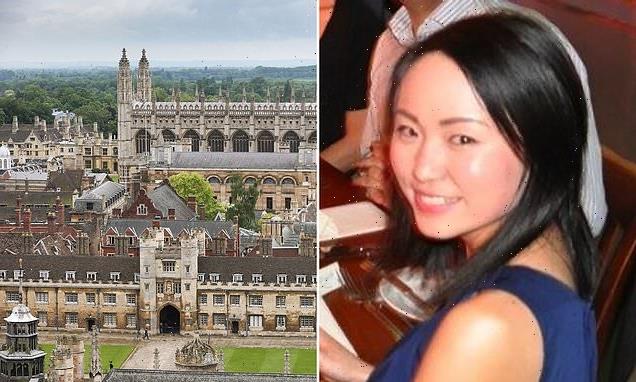Trainee surgeon, 37, waged smear campaign against innocent colleagues
Trainee surgeon, 37, is struck off for waging smear campaign against innocent senior colleagues after she was exposed for falsifying a major clinical study at Cambridge University
- Dr Zoe Sun made false complaints to the police about two innocent colleagues
- Came after she wrongly took credit for Cambridge University research project
- The research Sun took credit for later had to be reanalysed and resubmitted
- The trainee has now been struck off for ‘persistent and deliberate’ dishonesty
A trainee surgeon has been struck off after she waged a smear campaign against innocent senior colleagues when she was exposed for falsifying a major clinical study at Cambridge University.
Dr Zoe Sun, 37, accused two doctors of being sex pests and made false complaints about other colleagues after she wrongly took credit for a research project funded by pharmaceutical giants GlaxoSmithKline (GSK).
She reported the innocent medics to two police forces and, when detectives told her there was no evidence against them, instead told supervisors the pair were facing arrest as a criminal probe into her allegations was ‘still ongoing’.
The research Sun took credit for later had to be reanalysed and resubmitted after it was found to contain errors.
She has now been struck off the doctors’ register after a Medical Practitioners Tribunal Service (MPTS) hearing found her guilty of ‘persistent and deliberate’ dishonesty.
Dr Zoe Sun has been struck off for waging a smear campaign against innocent senior colleagues after she was exposed for falsifying a major clinical study
A misconduct panel heard the incidents began in April 2017 when Sun, who was a trainee in Vascular Surgery at Leeds Teaching Hospitals, was assigned to work at Cambridge as a Clinical Research Associate on a study called OPERA.
Sun’s role within the study was to collect data from the human subjects, analyse the results and report them to a senior medic in charge of the whole project before they were to be presented to GSK.
But in September 2018, she submitted a draft manuscript of the study to the Journal of the American Society of Nephrology (JASN): ‘Recombinant erythropoietin reduces endothelium-mediated vasodilation in pre-dialysis patients with CKD – a prospective controlled study.’
It was submitted without permission and she had removed the names of her co-authors.
When told to withdraw the draft manuscript, Sun ignored the instruction and instead emailed a Cambridge University professor saying: ‘Neither of them did a thing. GSK has seen the last version and given their permission.’
She subsequently quit Cambridge University, before lodging ‘wide-ranging and inaccurate’ complaints against her colleagues and wrongly claiming they had agreed to the manuscript’s publication.
Sun also claimed the professor was ‘not fit to be in education, research or clinical work’.
When told she was being referred to the General Medical Council (GMC) for misconduct, she then made a formal complaint against her supervisor – the Deputy Medical Director at Addenbrookes Hospital in Cambridge.
During July and August 2019, she made various report of harassment against the doctor and two other colleagues to both West Yorkshire Police and Cambridgeshire Police.
Both police forces told her they would not be pursuing her allegations due to a lack of evidence, but she instead told the GMC that two of her colleagues had ‘criminal proceedings against them with a warning by the police for sexual harassment and slandering of a female trainee’.
She added: ‘The investigation is ongoing and they have been issued with a warning by the police and they will be arrested if their actions continue.’
A misconduct panel heard that the incidents began in April 2017 when Sun, who was a trainee in Vascular Surgery at Leeds Teaching Hospitals, was assigned to work at Cambridge University (pictured) as a Clinical Research Associate on a study called OPERA
Sun then made an online report to Cambridgeshire Police that one of the doctors had assaulted her in the operating theatre.
She falsely claimed the doctor was ‘issued with a formal warning to stop his actions’ and made untrue assertions about police actions against the doctors.
Jane Oldfield, counsel for GMC at the tribunal, said: ‘Dr Sun’s repeated, varied, and far-reaching acts of dishonesty are both individually and collectively extremely serious.
‘Doctors are expected to abide by research governance principles, not place important studies in jeopardy by failing to hand over data and that they will not risk the good name of a study team and institution by submitting manuscripts which are effectively unverified and incomplete.
She added: ‘This represented a pattern of repeated behaviour over a period of 16 months which caused personal upset and distress to many and had the potential to result in harm to their professional reputation. ‘It is notoriously difficult to remediate dishonesty, and to rebuild trust where relationships have been irrevocably damaged.’
One of the falsely accused doctors, a post-graduate dean at Health Education England also said: ‘Dr Sun’s behaviour has affected me deeply on a personal level. I have never received an apology or expression of regret from Dr Sun in relation to the allegations she made against me.’
Marios Lambis, representing Sun, told the panel that the trainee medic’s ‘ethnic and cultural background’ may have contributed to to the case.
She said Sun has ‘recognised her actions and dishonesty were serious and wrong’, adding it was a ‘tragic story of mistakes and missed opportunities’.
Sun, meanwhile, apologised, saying: ‘I misinterpreted events and perceived a conspiracy of malice against me when there was none.
‘I am devastated by my actions and the pain I have caused.’
But MPTS chairman Paul Curtis told the hearing that a striking off order was the most appropriate action to take.
He said: ‘Dishonest actions have serious implications for a doctor and the profession as a whole. Whilst the Tribunal noted Dr Sun’s actions did not result in direct harm to patients, her dishonesty related to providing false statements which was particularly serious and caused distress and had significant consequences on her colleagues.
“The dishonesty included false statements made to Cambridge University, to colleagues, two separate police forces and to the GMC.
“Dr Sun submitted a research document which, when her results were re-analysed, they were found to be inaccurate and could be misleading.
‘Doctors must be honest and trustworthy and must make sure that their conduct justifies their patients’ trust in them. Dr Sun’s dishonesty was persistent, deliberate and continued over a period of 16 months.
“Whilst the Tribunal noted that Dr Sun does not present a risk to patient safety, it considered that action is necessary to maintain public confidence in the profession.
“Dr Sun’s dishonest actions have undermined the trust the public place in the medical profession. It is mindful that patients should be able to trust the integrity of doctors, and where a doctor undermines that trust, there is a risk to public confidence in the profession.
‘The nature, breadth and seriousness of her dishonesty was such that only erasure could be the appropriate and proportionate sanction.’
Source: Read Full Article





